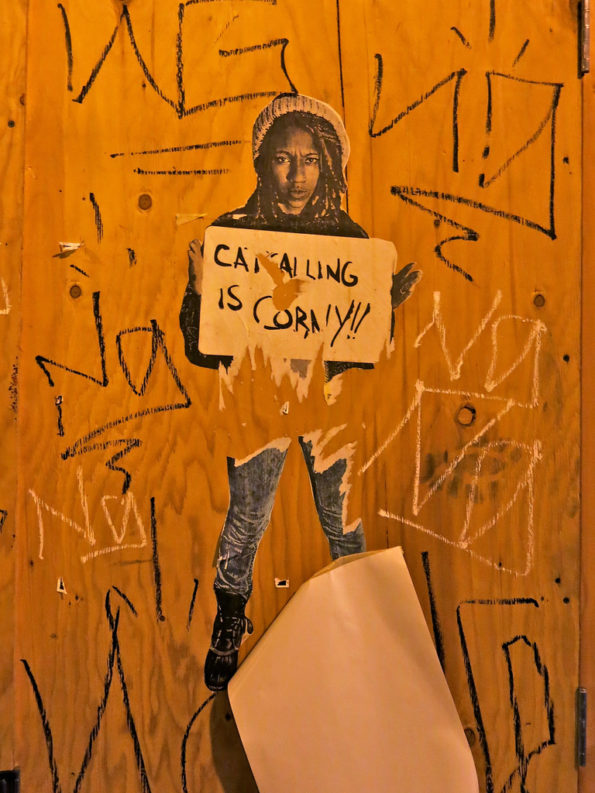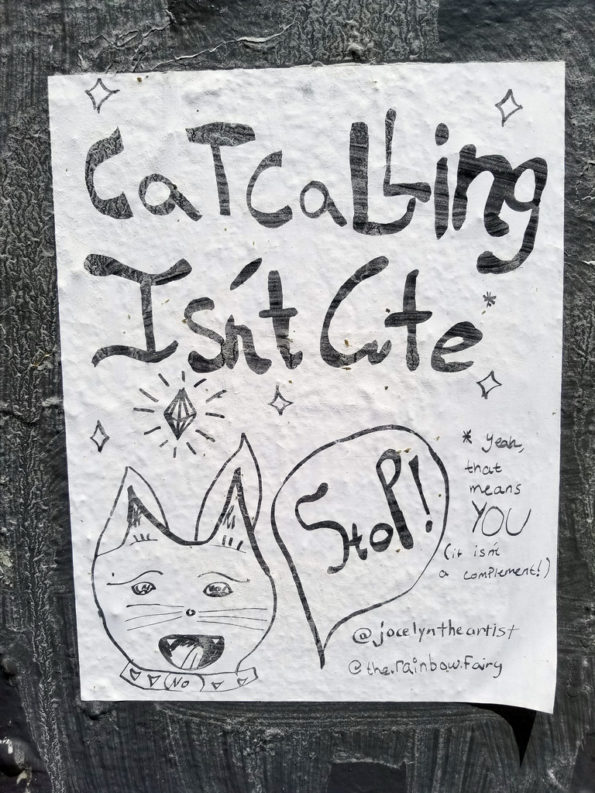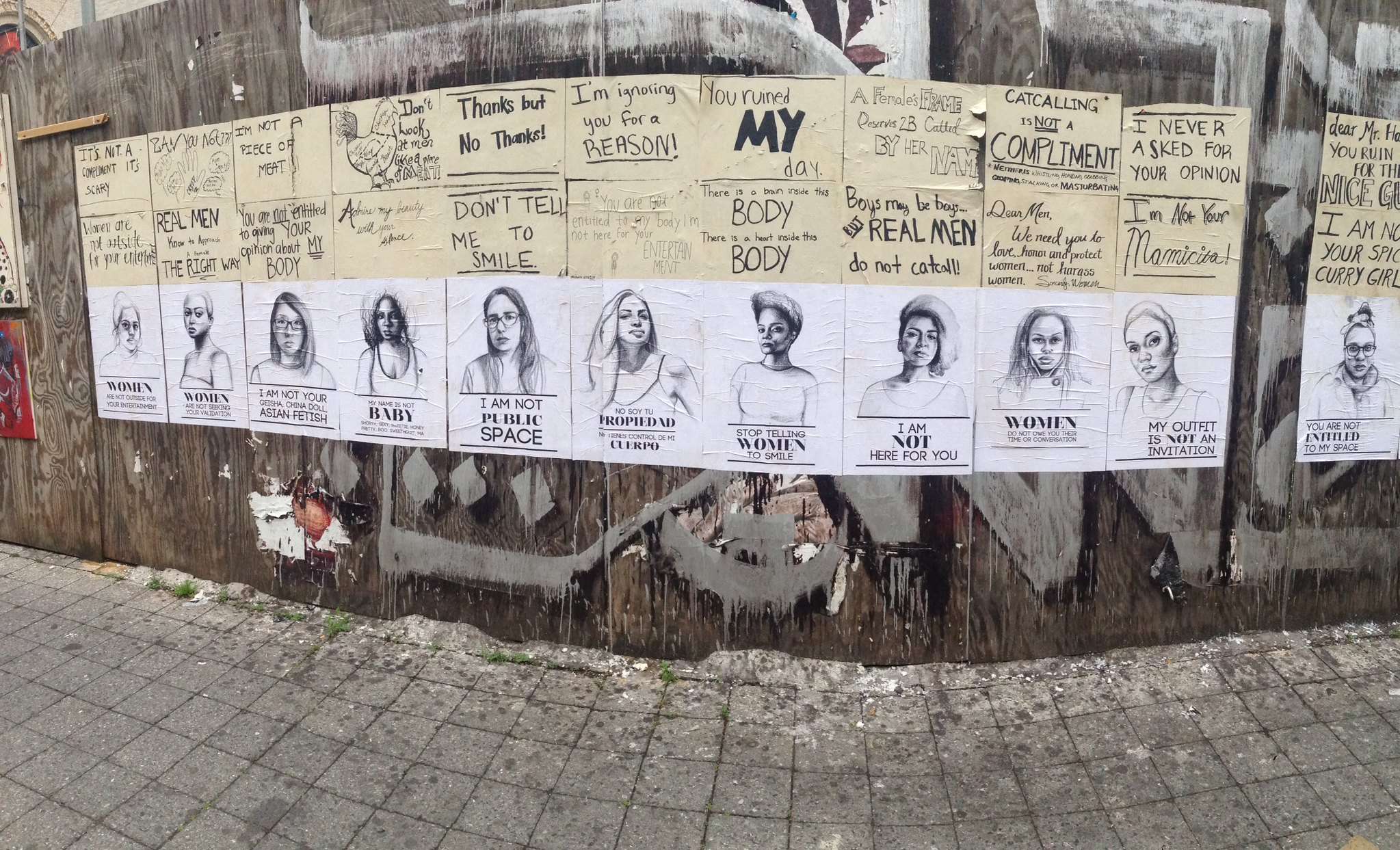Author’s note: I am an able-bodied, cisgender, white female, and that this blog post is based off of my experiences. Not every person has the same body and environment, this can affect the severity of their harassment and the victim’s perception. This is also not to say men cannot be victims of street harassment either or that women cannot be the aggressor. Predominantly, mainstream catcalling is men harassing women, and that is what I focus on. This blogs purpose is not to generalize what experiencing harassment is or to say what it means to you, but rather to shed light on the belief that harassment is complementing. *ASSAULT & VIOLENCE WARNING*
My Story
I had just turned thirteen and when to a theme park with my friends, I wore denim shorts and a tee shirt. My friends and I were walking from ride to ride, when two grown men approached me and began to call me “sexy”. They said that I “looked like a fun time”and should “try their ride”. I became very uncomfortable and told them to leave me and my friends alone,
“I’m thirteen”.
They seemed almost offended and taken back for a moment, instead of realizing what they had just said they started to call me a “skank”, “slutty”, and that “a thirteen year old girl should not leave the house wearing such short shorts unless she wanted the male attention it brought”. Almost four years later and I could tell you a run over of the whole day. How we had to stop at my friends moms work so she could grab the tickets, the guy who checked our tickets goofy glasses, or how the bald man with the sunglasses sitting on the brick ledge pulled his daughter and watched the two men follow me and my friends.
Looking back at it now, I didn’t know what the words they were saying meant. At thirteen I had figured out the definition of a skank. At thirteen I realized what they meant by “try their ride”. At thirteen I was cat called for the first time. Although many men find catcalling flirtatious and a way of complimenting women, catcalling is ultimately derogatory and objectifying to women as a whole.

torbakhopper’s Flickr
Catcalling or Flirting?
For some women they find catcalling as a compliment, boosting their confidence. Doree Lewak, author of “Hey ladies – catcalls are flattering! Deal with it”, states how she knows “I’m looking good, I brazenly walk past a construction site, anticipating that whistle and “Hey, mama!” catcall. Works every time — my ego and I can’t fit through the door!. She continues on about how these men exclaim what they want when they see it, unlike the boys of her college campus who did not. Towards the end of her feature she states that she “can be that objectified sex thing for them!”, but before voices “isn’t feminism all about self-empowerment anway”.
Well yes, feminism is about empowerment, but it is also in the support of end viewing women as sexual objects. Doree herself explains in her article that catcalling is objectifying women as some sort of walking sex doll, now isn’t that contradicting!
The Overwhelming Truth
A common misconception about catcalling is if it’s flirting or street harassment. Andrea Nagal of Times Live stated the differences between as, “flirting is about playfulness, catcalling is intended to demean; flirting assumes equality between the parties, catcalling is about dominance and manipulating the power dynamics of patriarchy; flirting is humanising, catcalling is objectifying; flirting is fun, catcalling is scary; flirting is consensual, catcalling is about power and control; flirting is one-on-one, catcalling is about group dynamics; flirting is respectful and catcalling is plain f**king rude.” The line between the two is quite simple, [perfectpullquote align=”full” bordertop=”false” cite=”” link=”” color=”” class=”” size=””]it’s OK to politely compliment a woman and move on, it’s not OK for them to make sexual advances or to become hostile. [/perfectpullquote]
Catcalling is also about the verbalist (typically male) to keep control of the situation. When women reply back to defend themselves, men will sometimes try to patronize themselves. Young men in America are even attempting to play the victim in these overwhelming cases of thousands of women speaking up in the #MeToo movement. Claiming, that their flirtations with a women, is going to have their name end up under a tweet captioned “#MeToo”. In a BBC Article, it claims: Another commenter — Kenny Herbert, a 58-year-old office manager in New York — leveled a somewhat different criticism at my argument. “The problem isn’t ‘millions of men … are afraid to say or do the wrong thing,’ because the decent and respectful man has little to fear. Raise your son to be an empathetic, caring man, and he will be okay,” he wrote. “The problem is millions of neanderthals are mad that we are holding them accountable for their actions, so they are creating the false equivalence that ALL men are potential targets of (relatively rare) false accusations.” This is a form of keeping the guilt of them by blaming women for over-reacting and publicizing a minor interaction that made her uncomfortable. If she puts his name out into the world as a harasser, his reputation is ruined by bringing unnecessary attention and drama to it. In reality, these women are holding these men accountable and finding strength through it.[perfectpullquote align=”full” bordertop=”false” cite=”” link=”” color=”” class=”” size=””] If men don’t want to face the reaction of their petty hoots and sexual remarks, then they should not do it in the first place. [/perfectpullquote]
Violence in Catcalling isn’t so uncommon
In some scenarios men will reply with violence in a way of recovering their masculinity. In 2014 , Mary Spears of Detroit Michigan was a victim of street harassment violence. After Mary declined the man, he continued to become angered and became physical with her. That’s when her fiance stepped in and the man pulled out a gun and killed her. Unfortunately this isn’t uncommon.
Penn, Schoen and Berland Associates conducted a survey consisting of 612 women. Of those women, 87% of women said they had been harassed by a stranger, over half of those women said that it evolved into “extreme” harassment. Extreme meaning being touched, grabbed, rubbed, brushed, or followed by the man. In a similar survey of 811 women said that [perfectpullquote align=”full” bordertop=”false” cite=”” link=”” color=”” class=”” size=””]street harassment began as early as 12 years old.[/perfectpullquote]
75% reported they had been followed by a man they did not know, more than 50% had been sexually touched, and 25% had been assaulted.

Quinn Dombrowski’s Flickr
In Conclusion
The fact that catcalling is so prominent today, presents the idea that this is a common problem that has not yet came to a peaceful resolution. As a teenage girl, who has been catcalled since age thirteen, this issue only gets worse as age increases and time goes on. As a society we need to abnormalize catcalling, and issue it is as harassment on the person being catcalled. Catcalling is not flirtatious, it is not seductive, and it certainly is not cute.
Featured Image: This is Awkward, Tatyana Fazlalizadehs’s Flickr





Bruh
“Catcalling isn’t cute.”
No, It’s hilarious.